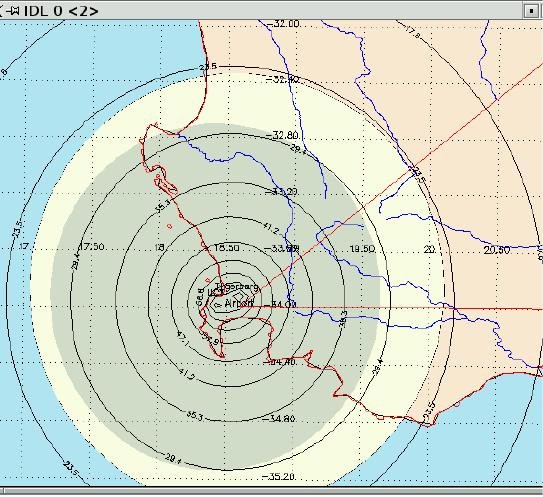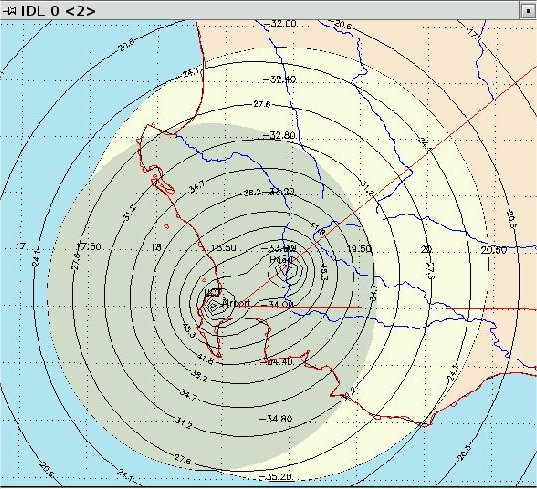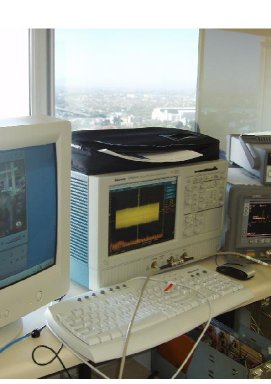TELEVISION-BASED
BISTATIC RADAR
|

Radar and Remote Sensing Group
Department of Electrical Engineering
University of Cape Town
|
Motivation
Much research and development in the
field of Multistatic radar has been performed throughout the years.
Alot of this work has either continued or evolved from projects and
research performed from as early as before WWII.
In the military sector, the complexity of
systems is growing rapidly to overcome new challenges associated with
military operations on both inland and the sea. The requirements of
radar systems, and other related applications in
particular, are changing in relation to these new challenges.
Some of the challenges includes designing systems which are not easily
detectable, and hence are immune to the enemy. Such systems involves a
low energy radiation level from the receiver.
Bistatic systems are such systems, whereby the receiver and the
transmitter are seperated by a comparable distance. Much of the energy
radiated by a radar, is mainly contributed by the transmitter. With
such a system, the transmitter is located elsewhere, and hence the
receiver is susceptable from damage. If however, the transmitter in use
had been destryoed, the receiver can be easily changed to adapted using
signals transmitted from other avalible transmitters.
For this particular research, the use of terrestrial television signals
will be used as the transmitting source.
Focus
This research project is focused on
the designs and sinulations of the television-based bistatic radar
system. The main focus surrounding this research is to gather the
literature related to this topic for an assesement on how to persue the
design and development for the system. Various systems have been
designed and implemented by people throughout the world, and most of
these systems have been looked into for the consideration of designing
such a system.
Besides from the hardware designs and simulations, a simulator has also
been created in IDL for the prediction of the SNR values for a certain
distance away from both the receiver and transmitter. This simulator is
specifically designed to indicate these SNR plots over South Africa.
Some real-time data has been captured via the use of a pc television
card, and the analysis of this data for Doppler extractions is
performed.
Methodology
A key aspect in the execution of
this research is determining a suitable balance between the analysis of
the acquired
documentation and literature, as well as the hardware and software
design process. Knowledge of the systems designed previously should be
acquired first in order to design an efficient and stable system.
Team
This research project is being
carried out by the following members shown in the Table below.
Name
|
Affiliation
|
Specialization
|
Ching-Wei, Wesley Chang
|
Department of Electrical
Engineering,
University of Cape Town
|
RF & Microwave Systems Design
|
Kanono Ramashemole
|
Department of Electrical
Engineering,
University of Cape Town
|
Tracking Algorithms for
Multistatic Systems
|
Prof. Mike Inggs
|
Department of Electrical
Engineering,
University of Cape Town |
Radar
systems |
Sam Reiners
|
Department of Electrical
Engineering,
University of Cape Town |
|
Project Status
The analysis of the
literature content has been complete, as well as the designs and
simulation for the system. Various programs and applications have been
produced for the analysis of the recorded data. Some of the images of
the equipment use for measurement, as well as the images produced from
the SNR simulator created can be seen below with two different
transmitting sites.
In both the instances, the receiver is located and the University of
Cape Town, while the transmitters are located and Tygerberg Hill, Cape
Town, and Paarl, Cape Town respectively.
Contact Information
If you would like more information on this project, interested
in participating in this project, or would like any information with
regards to this field, please don't hesitate to contact any of the
following
members, or make use of the Radar
& Remote Sensing website:
Wesley
Chang
University of Cape Town
Department of Electrical
Engineering
Menzies Building
RM 617
Private Bag
Rondebosch 7701
South Africa
Phone no.
(021) 650 3756
E-mail to: wesley@rrsg.ee.uct.ac.za
Prof. M.R. Inggs
University of Cape Town
Department of Electrical
Engineering
Menzies Building
RM 609
Private Bag
Rondebosch 7701
South Africa
Phone no.
(021) 650 2799
E-mail to: mikings@eng.uct.ac.za
Last Modified: 26 July 2005




